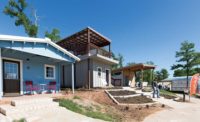In addition to delivering more than 1,000 modern residential units to citizens of Panama City who were living under precarious housing conditions, the Curundu urban renovation project initiated a transformation of a community beset by gang activity, social exclusion and high unemployment.
The challenges for contractor Construtora Norberto Odebrecht began before the start of the $108.8-million project, which included the erection of 63 four-story apartment buildings, improvements to the nearby river channel and the construction of roads, bridges, walkways and water- and sewer-system infrastructure. First, to relocate some of the roughly 5,000 displaced citizens, contractors built 320 temporary housing units, while another 680 families were relocated to existing facilities.
Additionally, since the project required the hiring of local residents, "employment opportunities were given to gang leaders and their followers, turning their negative leadership into a positive, [which] led to a reduction in violence." Most of the project's workforce was made up of local hires with little to no previous industry experience, including an estimated 85% of the masons, says Odebrecht.
Instead of using concrete masonry units to erect the building walls, however, the contractor used aluminum forms and the cast-in-place method for vertical construction. Despite the workforce issues, crews were able to complete construction of some apartments nearly 18 months ahead of schedule.
The end result was "amazing," said one of this year's judges, adding that the Curundu project was "thoughtfully designed, socially sensitive and uniquely challenging."
Owner: Ministerio de Vivienda
Architect: Gestion Urbana
General Contractor: Construtora Norberto Odebrecht SA
Structural Engineer: Jose Bultron
Civil Engineer: Ingeotec
MEP Engineer: Socoin









Post a comment to this article
Report Abusive Comment